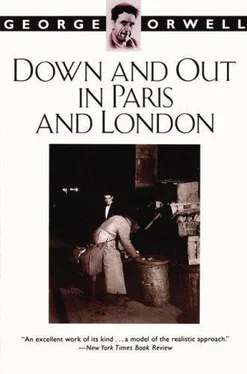George Orwell - Down and Out in Paris and London
Здесь есть возможность читать онлайн «George Orwell - Down and Out in Paris and London» весь текст электронной книги совершенно бесплатно (целиком полную версию без сокращений). В некоторых случаях можно слушать аудио, скачать через торрент в формате fb2 и присутствует краткое содержание. Жанр: Старинная литература, на русском языке. Описание произведения, (предисловие) а так же отзывы посетителей доступны на портале библиотеки ЛибКат.
- Название:Down and Out in Paris and London
- Автор:
- Жанр:
- Год:неизвестен
- ISBN:нет данных
- Рейтинг книги:5 / 5. Голосов: 1
-
Избранное:Добавить в избранное
- Отзывы:
-
Ваша оценка:
- 100
- 1
- 2
- 3
- 4
- 5
Down and Out in Paris and London: краткое содержание, описание и аннотация
Предлагаем к чтению аннотацию, описание, краткое содержание или предисловие (зависит от того, что написал сам автор книги «Down and Out in Paris and London»). Если вы не нашли необходимую информацию о книге — напишите в комментариях, мы постараемся отыскать её.
Down and Out in Paris and London — читать онлайн бесплатно полную книгу (весь текст) целиком
Ниже представлен текст книги, разбитый по страницам. Система сохранения места последней прочитанной страницы, позволяет с удобством читать онлайн бесплатно книгу «Down and Out in Paris and London», без необходимости каждый раз заново искать на чём Вы остановились. Поставьте закладку, и сможете в любой момент перейти на страницу, на которой закончили чтение.
Интервал:
Закладка:
dirt with powder.
Q ,. A secondary sexual difference?"
On the journey I fell in with a couple of Roumanians,
mere children, who were going to England on their
honeymoon trip. They asked innumerable questions
about England, and I told them some startling lies. I was
so pleased to be getting home, after being hard up for
months in a foreign city, that England seemed to me a
sort of Paradise. There are, indeed, many things in
England that make you glad to get home; bathrooms,
armchairs, mint sauce, new potatoes properly cooked,
brown bread, marmalade, beer made with veritable hops-
they are all splendid, if you can pay for them. England is
a very good country when you are not poor; and, of
course, with a tame imbecile to look after, I was not
going to be poor. The thought of not being poor made me
very patriotic. The more questions the Roumanians
asked, the more I praised England; the climate, the
scenery, the art, the literature, the laws-everything in
England was perfect.
Was the architecture in England good? the Rou-
manians asked. "Splendid!" I said. "And you should just
see the London statues! Paris is vulgar-half grandiosity
and half slums. But London-"
Then the boat drew alongside Tilbury pier. The first
building we saw on the waterside was one of those huge
hotels, all stucco and pinnacles, which stare from the
English coast like idiots staring over an asylum
wall. I saw the Roumanians, too polite to say anything,
cocking their eyes at the hotel. "Built by French
architects," I assured them; and even later, when the
train was crawling into London through the eastern
slums, I still kept it up about the beauties of English
architecture. Nothing seemed too good to say about
England, now that I was coming home and was not hard
up any more.
I went to B.'s office, and his first words knocked
everything to ruins. "I'm sorry," he said; "your employers
have gone abroad, patient and all. However, they'll be
back in a month. I suppose you can hang on till then?"
I was outside in the street before it even occurred to
me to borrow some more money. There was a month to
wait, and I had exactly nineteen and sixpence in hand.
The news had taken my breath away. For a long time I
could not make up my mind what to do. I loafed the day
in the streets, and at night, not having the slightest
notion of how to get a cheap bed in London, I went to a
"family" hotel, where the charge was seven and sixpence.
After paying the bill I had ten and twopence in hand.
By the morning I had made my plans. Sooner or later
I should have to go to B. for more money, but it seemed
hardly decent to do so yet, and in the meantime I must
exist in some hole-and-corner way. Past experience set
me against pawning my best suit. I would leave all my
things at the station cloakroom, except my second-best
suit, which I could exchange for some cheap clothes and
perhaps a pound. If I was going to live a month on thirty
shillings I must have bad clothes-indeed, the worse the
better. Whether thirty shillings could be made to last a
month I had no idea, not knowing London as I knew
Paris. Perhaps I could beg, or sell bootlaces, and I
remembered articles I had read in the Sunday papers about
beggars who have two thousand pounds sewn into their
trousers. It was, at any rate, notoriously impossible to
starve in London, so there was nothing to be anxious about.
To sell my clothes I went down into Lambeth, where
the people are poor and there are a lot of rag shops. At
the first shop I tried the proprietor was polite but
unhelpful; at the second he was rude; at the third he
was stone deaf, or pretended to be so. The fourth
shopman was a large blond young man, very pink all
over, like a slice of ham. He looked at the clothes I was
wearing and felt them disparagingly between thumb and
finger.
"Poor stuff," he said, "very poor stuff, that is." (It was
quite a good suit.) "What yer want for 'em?"
I explained that I wanted some older clothes and as
much money as he could spare. He thought for a moment,
then collected some dirty-looking rags and threw them on
to the counter. "What about the money?" I said, hoping for
a pound. He pursed his lips, then produced a
shilling and
laid it beside the clothes. I did not argue-I was going to
argue, but as I opened my mouth he reached out as
though to take up the shilling again; I saw that I was
helpless. He let me change in a small room behind the
shop.
The clothes were a coat, once dark brown, a pair of
black dungaree trousers, a scarf and a cloth cap; I had
kept my own shirt, socks and boots, and I had a comb and
razor in my pocket. It gives one a very strange feeling to be
wearing such clothes. I had worn bad enough things
before, but nothing at all like these; they were not merely
dirty and shapeless, they had - how is one to express it?-a
gracelessness, a patina of antique filth, quite different
from mere shabbiness.
They were the sort of clothes you see on a bootlace seller,
or a tramp. An hour later, in Lambeth, I saw a hang-dog
man, obviously a tramp, coming towards me, and when I
looked again it was myself, reflected in a shop window.
The dirt was plastering my face already. Dirt is a great
respecter of persons; it lets you alone when you are well
dressed, but as soon as your collar is gone it flies towards
you from all directions.
I stayed in the streets till late at night, keeping on the
move all the time. Dressed as I was, I was half afraid that
the police might arrest me as a vagabond, and I dared not
speak to anyone, imagining that they must notice a
disparity between my accent and my clothes. (Later I
discovered that this never happened.) My new clothes had
put me instantly into a new world. Everyone's demeanour
seemed to have changed abruptly. I helped a hawker pick
up a barrow that he had upset. "Thanks, mate," he said
with a grin. No one had called me mate before in my life-it
was the clothes that had done it. For the first time I
noticed, too, how the attitude of women varies with a
man's clothes. When a badly dressed man passes them
they shudder away from him with a quite frank movement
of disgust, as though he were a dead cat. Clothes are
powerful things. Dressed in a tramp's clothes it is very
difficult, at any rate for the first day, not to feel that you
are genuinely degraded. You might feel the same shame,
irrational but very real, your first night in prison.
At about eleven I began looking for a bed. I had read
about doss-houses (they are never called dosshouses, by
the way), and I supposed that one could get a bed for
fourpence or thereabouts. Seeing a man, a navvy or
something of the kind, standing on the kerb in the
Waterloo Road, I stopped and questioned him.
I said that I was stony broke and wanted the cheapest
bed I could get.
"Oh," said he, "you go to that 'ouse across the street
there, with the sign 'Good Beds for Single Men.' That's a
good kip [sleeping place], that is. I bin there myself on and
off You'll find it cheap
and clean."
It was a tall, battered-looking house, with dim lights in
all the windows, some of which were patched with brown
paper. I entered a stone passage-way, and a little etiolated
Читать дальшеИнтервал:
Закладка:
Похожие книги на «Down and Out in Paris and London»
Представляем Вашему вниманию похожие книги на «Down and Out in Paris and London» списком для выбора. Мы отобрали схожую по названию и смыслу литературу в надежде предоставить читателям больше вариантов отыскать новые, интересные, ещё непрочитанные произведения.
Обсуждение, отзывы о книге «Down and Out in Paris and London» и просто собственные мнения читателей. Оставьте ваши комментарии, напишите, что Вы думаете о произведении, его смысле или главных героях. Укажите что конкретно понравилось, а что нет, и почему Вы так считаете.












